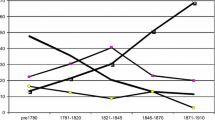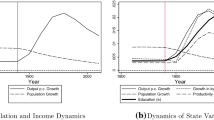Abstract
We provide a new data set on per capita book production as a proxy for advanced literacy skills, and assess this relative to other measures. While literacy proxies very basic skills, book production per capita is an indicator for more advanced capabilities. Growth theory suggests that human capital formation plays a significant role in creating the ‘wealth of nations.’ This study tests whether human capital formation has an impact on early-modern growth disparities. In contrast to some previous studies which denied the role of human capital as a crucial determinant of long-term growth, we confirm its importance.
Similar content being viewed by others
References
Acemoglu D., Johnson S., Robinson J. (2001) The colonial origins of comparative development: An empirical investigation. American Economic Review 91(5): 1369–1401
Acemoglu, D., Johnson, S., & Robinson, J. (2002). The rise of Europe: Atlantic trade, institutional change and economic growth. NBER Working Paper 9378.
Allen R.C. (2001) The great divergence in European wages and prices. Explorations in Economic History 38: 411–447. doi:10.1006/exeh.2001.0775
Allen R.C. (2003) Progress and poverty in early modern Europe. Economic History Review LVI- 3: 403–443. doi:10.1111/j.1468-0289.2003.00257.x
Alvarez Nogal, C. A., & Prados de la Escosura, L. (2007). Searching for the roots of retardation: Spain in European perspective, 1500–1850. Working Paper Univ. Carlos III de Madrid.
Anderson M., Lee R.D. (2002) ‘Malthus in state space: Macro economic-demographic relations in english history, 1540–1870. Journal of Population Economics 15(2): 195–220
Arnold, J., Bassanini, A., & Scarpetta, S. (2007). Solow or Lucas? Testing growth models using panel data from OECD countries. OECD Economics Dept. Working Papers 592.
Baten, J., & van Zanden, J. L. (2006). The impact of human capital on early modern welfare growth, 1450–1913: Book production as a human capital indicator. Working Paper Univ. Tuebingen/Univ. Utrecht.
Boucekkine R., Croix D., Licandro O. (2003) Early mortality declines at the dawn of modern growth. Scandinavian Journal of Economics 105(3): 401–418. doi:10.1111/1467-9442.t01-2-00005
Boucekkine R., Croix D., Peeters D. (2007) Early literacy achievements, population density, and the transition to modern growth. Journal of the European Economic Association 5(1): 183–226
Boucekkine, R., de la Croix, D., & Peeters, D. (2008). Disentangling the demographic determinants of the english take-off: 1530–1860. Population and Development Review (forthcoming).
Chartier R., Compère M.M., Julia D. (1976) L’Éducation en France di XVIe au XVIIIe Siècle. Sedes, Paris
Clark G. (2007) A farewell to alms: A brief economic history of the world. Princeton University Press, Princeton
Cressy D. (1980) Literacy and the social order–reading and writing in Tudor and Stuart England. Cambridge University Press, Cambridge
Croix D., Doepke M. (2004) Public versus private education when differential fertility matters. Journal of Development Economics 73(2): 607–629. doi:10.1016/j.jdeveco.2003.05.005
Darnton R. (2002) Book production in British India, 1850–1900. Book History 5: 239–262. 10.1353/bh.2002.0005
Durlauf, S. et al. (2005). Growth econometrics. In Ph. Aghion & S. Durlauf (Eds.), Handbook of economic growth. North-Holland.
Eisenstein, E. L. (1979). The printing press as an agent of change. Communications and cultural transformations in early-modern Europe, Cambridge University Press.
Fleury M., Valmary P. (1957) Les progrès de l’instruction élémentaire de Louis XIV à Napoléon III, d’après l’enquète de Louis Maggiolo 1877–1879. Population 12: 71–92. doi:10.2307/1525321
Galor O. (2005) From stagnation to growth: Unified growth theory. In: Aghion Ph., Durlauf S.(eds) Handbook of economic growth. North-Holland, Amsterdom
Galor O., Moav O. (2002) Natural selection and the origin of economic growth. Quarterly Journal of Economics 117: 1133–1192. doi:10.1162/003355302320935007
Galor O., Weil D.N. (2000) ‘Population, technology and growth: From the malthusian regime to the demographic transition. American Economic Review 90: 806–828
Glaeser E.L., La Porta R., Lopez-de-Silanes F., Shleifer A. (2004) Do institutions cause growth?. Journal of Economic Growth 9: 271–303
Graff H.J. (1987) The legacies of literacy. Indiana University Press, Bloomington
Hayami, A., & Kitô, H. (1999). Demography and living standards. In A. Hayami, O. Saito, & R. P. Toby (Eds.), The economic history of Japan: 1600–1990. Volume I: Emergence of economic society in Japan 1600–1859 (pp. 213–247). Oxford University Press.
Herlihy D. (1997) The black death and the transformation of the west. Harvard University Press, Cambridge, Mass
Hoeppner Moran J.A. (1985) The growth of English schooling 1340–1548: learning, literacy and laicization in pre-reformation york diocese. Princeton University Press, Princeton, New Jersey
Houdaille J. (1977) Les signatures au mariage de 1740 à 1829. Population 32: 65–90. doi:10.2307/1531591
Isa, Z. (1972). Printing and publishing in Indonesia: 1602–1970. Indiana University.
Koepke N., Baten J. (2005) The biological standard of living during the last two millennia. European Review of Economic History 9(1): 61–97
Kremer M.J. (1993) Population growth and technological change: 1,000,000 B.C. to 1990. Quarterly Journal of Economics 108: 681–716. doi:10.2307/2118405
van Leeuwen, B. (2007). Human capital and economic growth in Asia. An historical and quantitative analysis of India, Indonesia and Japan, 1890–2000. Manuscript Ph D thesis, Amsterdam.
Maddison A. (2001) The world economy: A millennial perspective. OECD, Paris
Marker G. (1982) Russia and the ‘Printing Revolution’: notes and observations. Slavic Review 41: 266–284. doi:10.2307/2496343
McCleary R.M., Barro R.J. (2006) Religion and economy. Journal of Economic Perspectives 20(2): 49–72. doi:10.1257/jep.20.2.49
Mitch D. (1993) The role of human capital in the first industrial revolution. In: Mokyr J.(eds) The British industrial revolution: An economic perspective. Westview Press, Boulder
Mokyr, J. (2002). The gifts of Athena. Historical origins of the knowledge society. Princeton University Press.
Mokyr, J., & Voth, H.-J. (2007). Understanding growth in Europe, 1700–1870: Theory and evidence. Working Paper NWU/UPF.
de Moor, C., & van Zanden, J. L. (2005). Girlpower. The European Marriage Pattern (EMP) and Labour Markets in the North Sea Region in the Late Medieval and Early Modern Period. Paper for the workshop ‘The Rise, Organization, and Institutional Framework of Factor Markets’, Amsterdam 2005.
Nalle S. (1989) Literacy and early modern culture in early modern castile. Past and Present 125: 65–96. doi:10.1093/past/125.1.65
Pamuk S. (2007) The black death and the origins of the ‘Great Divergence’ across Europe, 1300–1600. European Review of Economic History 11: 289–317. doi:10.1017/S1361491607002031
Pomeranz, K. (2000). The great divergence: Europe, China, and the making of the modern world economy. Princeton University Press.
Reis J. (2005) Economic growth, human capital formation and consumption in western Europe before 1800. In: Allen R.C., Bengtsson T., Dribe M.(eds) Living standards in the past. Oxford University Press, Oxford, pp 195–225
St. Clair W. (2004) The reading nation in the romantic period. Cambridge University Press, Cambridge
Stephens W.B. (1990) Literacy in England, Scotland, and Wales, 1500–1900. History of Education Quarterly 30: 545–71. doi:10.2307/368946
Tsuen-Hsuin T. (1985) Paper and printing. Cambridge University Press, Science and civilization in China (Vol 5). Cambridge
Vandenbroeke C. (1985) Sociale Geschiedenis van het Vlaamse Volk. Leuven, Kritak
Zanden J.L. (1991) The first green revolution. The growth of production and productivity in European agriculture. Economic History Review XLIV: 215–239
van Zanden, J. L. (2004). Common workmen, philosophers and the birth of the European knowledge economy. About the price and the production of useful knowledge in Europe 1350–1800. Paper for the GEHN conference on Useful Knowledge, Leiden, September 2004; revised 12 October 2004.
Weber Max (1958) The protestant ethic and the spirit of capitalism. Scribner, New York
Author information
Authors and Affiliations
Corresponding author
Rights and permissions
About this article
Cite this article
Baten, J., van Zanden, J.L. Book production and the onset of modern economic growth. J Econ Growth 13, 217–235 (2008). https://doi.org/10.1007/s10887-008-9031-9
Published:
Issue Date:
DOI: https://doi.org/10.1007/s10887-008-9031-9




